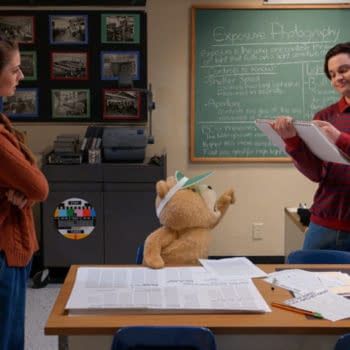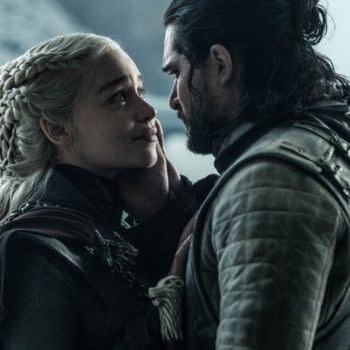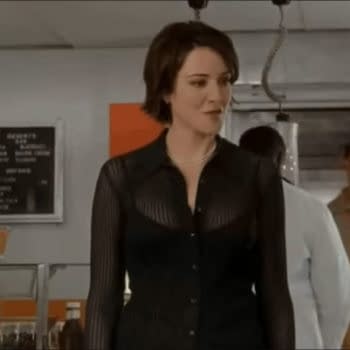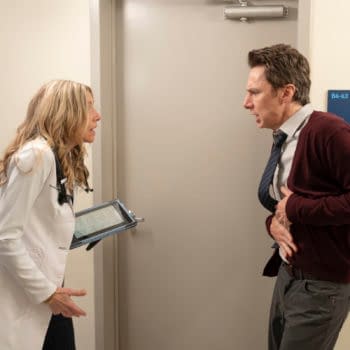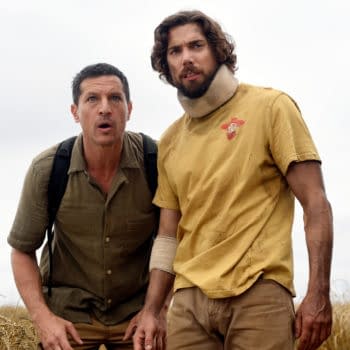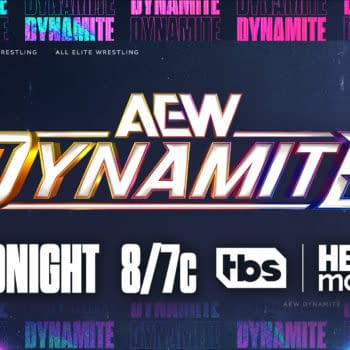Posted in: Paramount+, Star Trek, streaming, TV | Tagged: jean-luc picard, paramount, patrick stewart, star trek, Star Trek Picard, Star Trek: The Next Generation
Star Trek: Patrick Stewart "Made 2 Conditions" Before "Picard" Return
Sir Patrick Stewart reflects on his 36-year journey in the Star Trek franchise, from his casting on The Next Generation to the Picard finale.
As a classically trained Shakespearean actor embracing the science fiction juggernaut of Star Trek's exactly a career goal for Sir Patrick Stewart, especially when he was initially cast as the lead in Captain Jean-Luc Picard on the Paramount syndicated series Star Trek: The Next Generation. While Stewart accepted the gig with its first season in 1987, the actor had doubts about its initial survival, let alone lasting seven seasons. Here we are 36 years later – after seven seasons, four theatrical films, and three-season legacy sequel series Picard which wrapped on April 20th on Paramount+. Stewart discussed his journey with the Los Angeles Times his journey in the franchise and how it became his career-defining role in Hollywood.
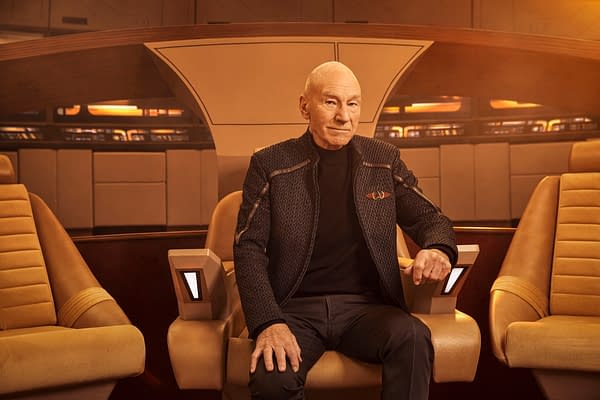
How Star Trek Made Patrick Stewart into a Star
On Stewart's exposure to NBC's TOS, "I may have heard of it. When my children were young, I used to race home from the theater in Stratford after the matinee so I could help with their supper and read them a story before racing back to do an evening performance," he said. "And they'd watch this show, which I used to occasionally see when I came home on Saturday afternoon, these guys wearing different color T-shirts. That's all I knew."
The actor recalled being recruited. "So I was told that it was a new 'Star Trek' series, and I went to Gene Roddenberry's house and was greeted at the door by this man, Robert Justman, who had been at the university the previous night and had called Gene Roddenberry and said, 'I think we found an actor we've got to have in the show.' When I arrived, there were two other men there besides Gene and Robert, and nobody asked me to sit down. We talked for about 10 minutes standing up, and then Gene said, 'Thanks for coming over,' and goodbye. And I was back on the street, and I thought, 'Bloody hell, what the heck was that about?'"
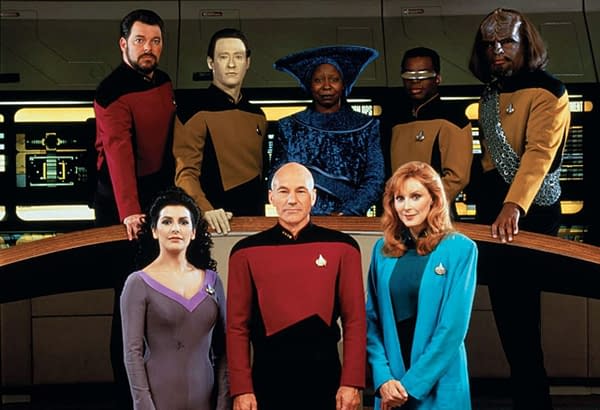
Stewart initially scoffed at the idea. "It was a style of work I never associated with or even particularly watched when I was younger. Sci-fi didn't have any interest for me. What was of interest was that it was on camera, it was in California, it was in Hollywood. My agent took me out to lunch and said, 'I've got to walk you through the deal.' And when he told me some of the details, I was totally disbelieving, what my salary per episode would be — incomprehensible. I couldn't imagine that, nor indeed had I ever wanted it. I just loved the work I was doing, [playing] Shakespeare and other great dramatists." Eventually, he warmed to the show, "It took a long time. I worked very, very hard. I wanted to do good work because I thought this might be my passport to Hollywood. Well, seven years later, we wrapped the series, and then we did four movies. It was the biggest thing that's ever happened to me."
When Stewart was initially pitched about Picard," Oh, so different [comparing 'Picard' and 'TNG']. I turned it down at first. And then I thought about the offer and decided I would do it, but I made two conditions," he recalled. "I didn't want to wear a uniform, and it must not be a series that is fundamentally a sentimental reunion of 'The Next Generation.' And they agreed to that. And I think the first 'Next Generation' character who came on the show was Jonathan Frakes [as Will Riker], and then in Season 2, Marina Sirtis, who played Counselor Troi, was also in it. And to my great pleasure, I enjoyed having them back on the soundstage. We've all aged, all of us. I mean, Michael Dorn [who plays Worf], whose hair is white! And Jonathan with his grizzled gray beard. And me, of course, with my hollowed cheeks and exhausted appearance."
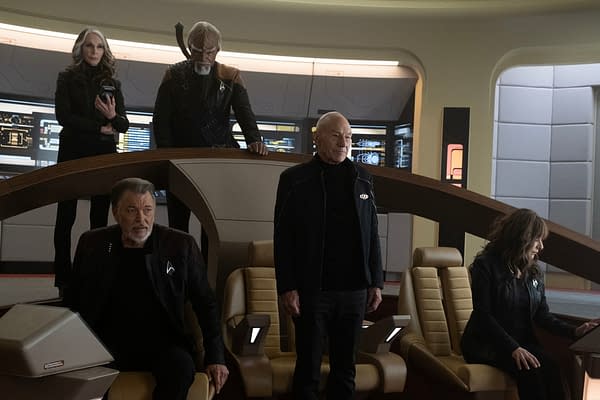
As the title suggests, the Paramount+ series ended up far more about the former U.S.S. Enterprise-D captain's life after his heyday on the outside of the Federation looking in. "I think it was [producer] Alex Kurtzman who said, 'Look, 20 years have passed, and in those 20 years, surely a lot has happened to you, Patrick. I know enough about your life to know there have been upheavals and changes. Surely, the same has happened to Jean-Luc Picard. What might those things be?'" Stewart recalled. "Well, I actually invented a whole story about those missing years; this may sound a little pretentious, but to create that past, which I assume will never, ever be known, was very intimate, and it influenced me when we began shooting 'Picard.' Because I knew he had needs, longings, and desires that were not being fulfilled. Disappointment that things had not gone the way he had hoped. Loneliness. Separation from these people he had loved and admired."
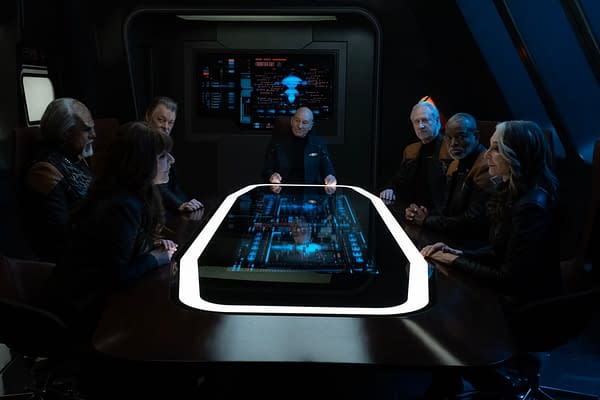
As far as revisiting the Borg, there was one thing Stewart is glad to be moving on from, "There are moments when I look at scenes in 'Picard' and think, 'Poor guy, [laughing] he looks terrible. He's having such a bad time.' That wasn't my intention, but that was what was being communicated. Anxiety, stress, irritation. I never yelled as Picard — I mean, I may have done — 'The line must be drawn here!' [pronounced 'hee-yah,' the much-memed dialogue from the film 'Star Trek: First Contact'], for which I was made fun of for decades. Actually, there was one like it in the last episode, and I thought, "At least because there aren't any more episodes, nobody will be making fun of me." We made fun of one another a lot." For more, including Stewart sharing TNG memories, lifelong friendships from the cast, theatre, and more, you can check out the interview here.






